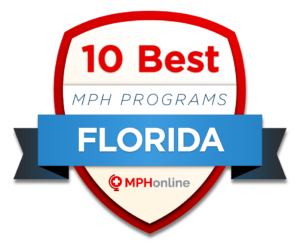 Florida is many thing to Americans – vacation destination, source of all things citrus, endlessly rewarding haven of bizarre true-crime stories. But it’s also a place with unique public health challenges. As the only genuinely tropical place in the contiguous US, Florida has health dangers not typically seen in the rest of the nation. Tropical diseases have long made Florida an epidemiologist’s biggest laboratory. Meanwhile, massive metropolitan cities built on former wetlands and swamps mean environmental dangers not typically seen elsewhere, from alligators to Zika-carrying mosquitos.
Florida is many thing to Americans – vacation destination, source of all things citrus, endlessly rewarding haven of bizarre true-crime stories. But it’s also a place with unique public health challenges. As the only genuinely tropical place in the contiguous US, Florida has health dangers not typically seen in the rest of the nation. Tropical diseases have long made Florida an epidemiologist’s biggest laboratory. Meanwhile, massive metropolitan cities built on former wetlands and swamps mean environmental dangers not typically seen elsewhere, from alligators to Zika-carrying mosquitos.
To meet all of these needs, the best public health schools in Florida are preparing their students for anything and everything that might come their way as public health professionals. MPH programs in Florida prepare students for diverse populations, urban and rural public health, environmental public health, and a rapidly changing climate. MPHOnline is helping public health professionals find the right MPH program for their careers with our ranking of the Best MPH Programs in Florida.
Featured MPH Programs
How We Ranked the Best MPH Programs in Florida
Our focus at MPHOnline is on getting prospective public health leaders into the program that will fit their needs, advance their career, and help them help all of us. For that purpose, MPHOnline editors researched accredited, trusted MPH programs in Florida to find the public health schools that best balance quality and return on investment. To rank schools, we used three equally-weighted criteria: Cost, Reputation, and Salary Expectation, with data drawn from College Scorecard, IPEDS, and Niche.
1. The University of Florida — Gainesville, FL.
 The University of Florida’s (UF) College of Public Health and Health Professions offers a Master of Public Health degree program that can be completed on-campus or online. The school’s Florida MPH degree program offers students six concentration areas — Epidemiology, Public Health Practice, Biostatistics, Public Health Policy, are available on-campus. Public Health Practice and Environmental Health are available as either on-campus or online degrees. The University of Florida offers an accelerated MPH degree program, as well as several collaborative joint degree options. Coursework includes a thesis and public health internship.
The University of Florida’s (UF) College of Public Health and Health Professions offers a Master of Public Health degree program that can be completed on-campus or online. The school’s Florida MPH degree program offers students six concentration areas — Epidemiology, Public Health Practice, Biostatistics, Public Health Policy, are available on-campus. Public Health Practice and Environmental Health are available as either on-campus or online degrees. The University of Florida offers an accelerated MPH degree program, as well as several collaborative joint degree options. Coursework includes a thesis and public health internship.
The University of Florida was established in 1853 under the Morrill Land Act. UF is a senior member school of the State University System of Florida and its flagship school. UF holds the distinction of being a sea grant university, space grant university, and land grant university. The University of Florida’s suburban campus is home to nearly 56,000 students and more than 5,300 faculty and staff members.
2. Florida State University — Tallahassee, FL.
 Florida State University’s (FSU) College of Social Sciences and Public Policy offers a Master of Public Health degree program that prepares students for leadership positions in the challenging field of public health. FSU’s public health graduates will be prepared for rewarding careers in government agencies, health care and managed care organizations and health departments at the state and local level. Degree candidates learn the skills necessary to advocate for healthy living and its promotion. As Florida State University is located the state capital, there are many internships and job opportunities in the city.
Florida State University’s (FSU) College of Social Sciences and Public Policy offers a Master of Public Health degree program that prepares students for leadership positions in the challenging field of public health. FSU’s public health graduates will be prepared for rewarding careers in government agencies, health care and managed care organizations and health departments at the state and local level. Degree candidates learn the skills necessary to advocate for healthy living and its promotion. As Florida State University is located the state capital, there are many internships and job opportunities in the city.
Florida State University was established in 1851 in the state capital of Tallahassee. US News recognizes Florida State University among the top 30 top public institutions of higher learning in the state of Florida. FSU’s 1,500+-acres in Northern Florida is home to nearly 42,000 students, supported by nearly 6,000 faculty and staff members.
3. The University of South Florida — Tampa, FL.
 The University of South Florida’s (USF) College of Public Health offers a 42-credit unit Master of Public Health degree program with numerous concentrations. Coursework includes classes in the topics of occupational health, safety management, risk assessment disaster management, and maternal & child health, among others. Several concentrations are available to complete entirely online. These include Nutrition and Dietetics, Infection Control, Global Disaster Management, among others. The Council on Education in Public Health accredits the schools MPH programs in Florida.
The University of South Florida’s (USF) College of Public Health offers a 42-credit unit Master of Public Health degree program with numerous concentrations. Coursework includes classes in the topics of occupational health, safety management, risk assessment disaster management, and maternal & child health, among others. Several concentrations are available to complete entirely online. These include Nutrition and Dietetics, Infection Control, Global Disaster Management, among others. The Council on Education in Public Health accredits the schools MPH programs in Florida.
The University of South Florida is a public university that was established in 1956. The University of South Florida has the fourth largest student enrollment in the Sunshine State. The University of South Florida is organized using three academic/member institutions, the USF Sarasota-Manatee campus, the USF Tampa campus, and the USF St Petersburg campus.
4. The University of Miami — Coral Gables, FL.
 The University of Miami’s (UM) Miller School of Medicine offers an on-campus Master of Public Health degree program that has been accredited by the Council on Education of Public Health (CEPH). Degree candidates typically finish the University of Miami’s MPH program in two years. The MPH degree program requires the completion of 45 credit units, which includes a six-credit capstone experience to graduate. The University of Miami offers three dual degree options with an MPA, MAIA and JD degree. The Miller School of Medicine can only accept US citizens and DACA students.
The University of Miami’s (UM) Miller School of Medicine offers an on-campus Master of Public Health degree program that has been accredited by the Council on Education of Public Health (CEPH). Degree candidates typically finish the University of Miami’s MPH program in two years. The MPH degree program requires the completion of 45 credit units, which includes a six-credit capstone experience to graduate. The University of Miami offers three dual degree options with an MPA, MAIA and JD degree. The Miller School of Medicine can only accept US citizens and DACA students.
The University of Miami is a private university that was established in 1925. UM’s twelve schools/colleges offer several hundred-degree programs at the undergraduate, graduate and doctoral level. The University of Miami’s 450+-acre suburban campus is home to nearly 13,000 schools and located nearby to downtown Miami. The University of Miami is one of the largest employers in Miami-Dade County.
5. Florida International University — University Park, FL.
 Florida International University’s (FIU) Robert Stempel College of Public Health & Social Work offers a Master of Public Health degree program that is available on-campus or through the school’s distance learning platform. FIU’s MPH degree program requires the completion of 45 credit units and the successful completion of an Integrative Seminar in Public Health and a practicum in a local Public Health facility or agency. The Council on Education of Public Health (CEPH) accredits FIU’s MPH programs.
Florida International University’s (FIU) Robert Stempel College of Public Health & Social Work offers a Master of Public Health degree program that is available on-campus or through the school’s distance learning platform. FIU’s MPH degree program requires the completion of 45 credit units and the successful completion of an Integrative Seminar in Public Health and a practicum in a local Public Health facility or agency. The Council on Education of Public Health (CEPH) accredits FIU’s MPH programs.
Florida International University is a public institution of higher learning that was established in 1965. FIU is a member school of the State University System of Florida. The school has two campuses; the 575-acre main campus is located in Miami’s metro area. The Florida International University is organized with 23 academic colleges/schools that offer nearly 200-degree programs.
6. The University of North Florida — Jacksonville, FL.
 The University of North Florida’s (UNF) Brooks College of Health offers a Master of Public Health degree program accredited by the Council on Education of Public Health (CEPH). The University of North Florida’s on-campus program offers two public health concentrations — Health Promotion and Health Education, or Epidemiology. Students graduate prepared to address public health issues employed by the government, a nonprofit organization, a health care facility or even school environments. UNF MPH students are required to complete a capstone in public health and a 150-hour summer internship. Credit requirements depend upon the chosen concentration and are either 43 or 46 credit hours.
The University of North Florida’s (UNF) Brooks College of Health offers a Master of Public Health degree program accredited by the Council on Education of Public Health (CEPH). The University of North Florida’s on-campus program offers two public health concentrations — Health Promotion and Health Education, or Epidemiology. Students graduate prepared to address public health issues employed by the government, a nonprofit organization, a health care facility or even school environments. UNF MPH students are required to complete a capstone in public health and a 150-hour summer internship. Credit requirements depend upon the chosen concentration and are either 43 or 46 credit hours.
The University of North Florida was established in 1972. The University of North Florida is a member school of the State University System of Florida and organized into five schools/colleges offering more than 50 baccalaureate degree programs. Most students attending classes at UNF are non-resident. US News has recognized the University of North Florida one of the ‘best value’ schools in the country.
7. Nova Southeastern University — Fort Lauderdale, FL.
 Nova Southeastern University’s (NSU) Dr. Kiran C. Patel College of Osteopathic Medicine offers an on-campus and online option for their Master of Public Health degree program. Coursework includes the core public health competencies in the fields of behavioral science, environmental health, and epidemiology. MPH degree graduates at Nova Southeastern will also be required to complete a practicum — a public health hands-on experience in order to graduate. The MPH program curriculum is the same for online students and for those students attending classes on-campus. The Council on Education of Public Health (CEPH) accredits Nova Southeastern University’s Master of Public Health degree programs.
Nova Southeastern University’s (NSU) Dr. Kiran C. Patel College of Osteopathic Medicine offers an on-campus and online option for their Master of Public Health degree program. Coursework includes the core public health competencies in the fields of behavioral science, environmental health, and epidemiology. MPH degree graduates at Nova Southeastern will also be required to complete a practicum — a public health hands-on experience in order to graduate. The MPH program curriculum is the same for online students and for those students attending classes on-campus. The Council on Education of Public Health (CEPH) accredits Nova Southeastern University’s Master of Public Health degree programs.
Nova Southeastern University is a private school that was established in 1964. The school’s main 475+-acre campus in Davie Florida is home to more than 21,000 students studying for degrees awarded from 18 schools/colleges. Nova Southeastern University has satellite campuses in Puerto Rico, Dania Beach, and North Miami Beach Florida.
8. Florida A&M University — Tallahassee, FL.
 Florida A&M University’s (FAMU) College of Pharmacy & Pharmaceutical Sciences offers a Master of Public Health degree program that is available online or on-campus. FAMU’s MPH programs in Florida require the completion of 50 credit hours and a six-credit practicum within a public health environment. Additionally, degree candidates must successfully pass the MPH comprehensive exam given at the end of the program. FAMU’s online MPH differs then its on-campus counterpart in that the on-campus version includes additional training in certain core public health issues.
Florida A&M University’s (FAMU) College of Pharmacy & Pharmaceutical Sciences offers a Master of Public Health degree program that is available online or on-campus. FAMU’s MPH programs in Florida require the completion of 50 credit hours and a six-credit practicum within a public health environment. Additionally, degree candidates must successfully pass the MPH comprehensive exam given at the end of the program. FAMU’s online MPH differs then its on-campus counterpart in that the on-campus version includes additional training in certain core public health issues.
Florida A&M University was established in 1887 under the Morrill Land Act. Florida A&M University is recognized as the fifth largest Historically Black College & University (HBCU) in the nation and the only historically black university located in the State of Florida. US News recognizes Florida A&M University among its best colleges, region list. The school’s 400+ acre urban campus is located in the state’s capital and home to more than 9,500 students.
9. The University of West Florida — Pensacola, FL.
 The University of West Florida’s (UWF) Usha Kundu, MD College of Health/Institute of Public health offers an online 42 credit unit Master of Public Health program that has received accreditation from the Council on Education of Public Health (CEPH). Students explore public health’s five core competencies of Biostatistics, epidemiology, behavioral sciences, health policy/management, and health education. The University of West Florida’s MPH program requires the completion of a six-credit public health facility internship guided by the student’s advisor. Additionally, degree candidates must successfully pass the MPH comprehensive exam given at the end of the program.
The University of West Florida’s (UWF) Usha Kundu, MD College of Health/Institute of Public health offers an online 42 credit unit Master of Public Health program that has received accreditation from the Council on Education of Public Health (CEPH). Students explore public health’s five core competencies of Biostatistics, epidemiology, behavioral sciences, health policy/management, and health education. The University of West Florida’s MPH program requires the completion of a six-credit public health facility internship guided by the student’s advisor. Additionally, degree candidates must successfully pass the MPH comprehensive exam given at the end of the program.
The University of West Florida was established in 1963 and is a member school of the State University System of Florida. UWF’s 1,600-acre campus is the third largest in the system and natures preserve; home to nearly 13,000 students. The school enrolls many military members who have been assigned to the nearby militarily facilities.
10. Rollins College – Winter Park, FL.
 Rollins College’s Hamilton Holt School offers an on-campus Master of Public health degree program that requires the completion of 49 credit units, a 100-hour practicum at a public health facility, and a capstone project to graduate. Typically, students complete Rollins College’s MPH program within a two to three year time period. Core classes include Health Science Research Methods, Applied Biostatistics, Public Health Management, and Comparative Health Systems, among others.
Rollins College’s Hamilton Holt School offers an on-campus Master of Public health degree program that requires the completion of 49 credit units, a 100-hour practicum at a public health facility, and a capstone project to graduate. Typically, students complete Rollins College’s MPH program within a two to three year time period. Core classes include Health Science Research Methods, Applied Biostatistics, Public Health Management, and Comparative Health Systems, among others.
Rollins College was established in 1885 and holds the distinction of being the oldest post-secondary school in the state of Florida. Rollins is a liberal arts school that sits along the shores of Lake Virginia in Central Florida. More than 3,200 students attend classes on the school’s 80-acre campus — a campus considered by Princeton Review among the most beautiful in the country.
Public Health in Florida
Public health care will always serve a vital role in society. Without a decent health care system in place, populations become much more susceptible to preventable disease and illness. Public health care isn’t just concerned with disease prevention; this sector is concerned with promoting environmental health, mental health, behavioral health, reproductive health, occupational safety, community building, public policy, and research.
Do you have an interest in improving Florida’s public health care? Here is what you need to know about public health programs in the sunshine state.
Frequently Asked Questions about MPH Programs in Florida:
1. How do I become a public health professional in Florida?
Start by learning about the available public health schools within the state. Colleges, universities, and trade schools are offering healthcare educations that specialize in teaching students about public health work. A good education will emphasize how to promote healthy behaviors, how to identify major health risks, and how to provide quality care to a large population of people. Training for this sector usually involves degree level education from an accredited school.
Public health programs in Florida offer a variety of degrees and certificates for those seeking employment in this area. There are many speciality degrees that combine regular healthcare with public health education; for example, a nurse could find a public health nursing degree. A Master of Science in Public Health, a Master of Public Health, and a Doctor of Health Science are among the top degrees in this field.
2. What do public health professionals do?
It is common for public health organizations to provide services in disease prevention, sanitation, sexual safety, vaccinations, suicide prevention, contraceptive distribution, and biostatics. These organizations also perform research on care and illness prevention.
3. How is the job market for public health in Florida?
As the baby boomer population ages, there will be a higher demand for Florida public health jobs to address healthcare needs. The need for epidemiology experts will also rise due to an increase in disease; The CDC reports that illnesses and disease are on the rise.
The website for the Florida Department of Health states that there is a high demand for health care jobs. The state is looking for workers to fulfill a variety of roles, from vaccination efforts to educating the public about tobacco. Florida’s most in-demand job is registered nursing, with over 7,000 job openings available in the state. Registered nursing is expected to grow by 13.09 percent by 2021.
4. Where can I work in public health in Florida?
Florida’s main public health organizations are the Florida Public Health Department and the Florida Public Health Association (FPHA). The FPHA is more focused on networking and organizing public health workers, while the Florida Public Health Department is an executive branch that provides a range of services. Those services include programs in food, nutrition, literacy, medicaid planning, contraceptives, sex education, pregnancy resources, statistics and data, immunization, lead poisoning prevention, water safety, dental health, refugee healthcare, rural healthcare, emergency response, illness campaigning, prenatal care, nutrition education, substance abuse aid, stress prevention, environmental monitoring and protection, injury prevention, and more. In addition to this, the department does research into specific public health issues and preventative methods for those issues.
The public health sector hires a number of professionals to work in this field: nurses, physicians, epidemiologists, biostatisticians, medical scientists, sociologists, psychologists, medical assistants, biologists, health inspectors, environmental health officers, reproductive health specialists, geneticists, and economists. All of these health care specialists work to prevent public issues and to promote healthy choices among the population.
5. How much money do public health workers make?
This will be dependent on the type of job the professional takes up. According to salary databases, the highest paid public health careers include safety engineers, environmental scientists, healthcare administrators, epidemiologists, and those who hold doctorate degrees. Public health workers can make anywhere from $38,000 to over $100,000 per year.
Related articles:
Best 25 Campus MPH programs
Top 25 Online MPH Community Health Degree Programs